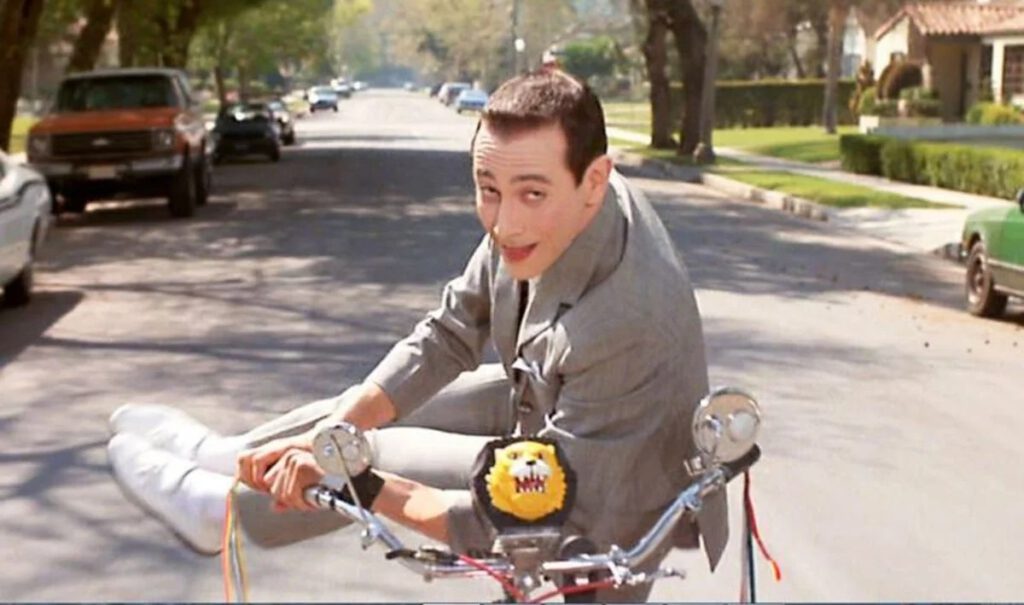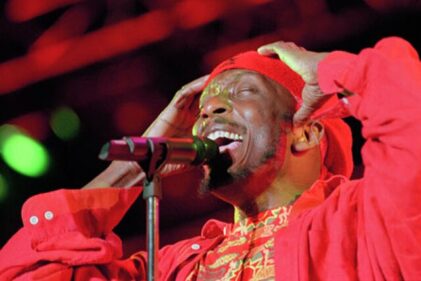“I know you are, but what am I?” wasn’t just some line from a movie. Growing up in the late-’80s and early-’90s, it was a ubiquitous retort to any insult a childhood bully could hurdle at you. It made outsiders feel impervious. It was schoolyard armor. And it will remain as timeless as the man who first uttered the line, Paul Reubens, in the guise of his immortal alter-ego Pee-wee Herman, who passed away this week after a six-year-long battle with cancer. He was 70 years old.
I don’t remember a time before Pee-wee Herman. He was always a big part of my life, and of so many others. As memories and stories flooded my timeline from his famous friends, his colleagues, almost everyone else, and my own heart, it’s clear his impact was vast and incomparable.
His unique brand of absurd humor, dainty mannerisms, quirky facial expressions, and subversive nostalgia infused with progressive inclusivity (and plenty of innuendo) spoke to many queer people, young and old. He was a weirdo through and through, free to express that weirdness at top volume, and for most of the 1980s, he was embraced by the mainstream in a way that few such oddballs had been afforded.
Growing up in Sarasota, Florida, the son of a teacher and a World War II fighter pilot, Reubens’ comic sensibilities were formed by watching “I Love Lucy” and visiting Ringling Bros. Circus. He knew from a young age he wanted to make people laugh.
After studying at Boston University, Reubens headed out West to attend the California Institute of the Arts (CalArts), where he studied under pioneering performance artist Allan Kaprow. Changing his last name from Rubenfeld to Reubens, he cut his teeth with guest appearances on “The Gong Show” before joining the famed Los Angeles-based improv troupe The Groundlings, where he performed with Phil Hartman, slowly developing his famous alter-ego.
The perpetually optimistic Pee-wee Herman was wonderstruck by the novelties in life, like dinosaurs and genies and cowboys and frilly dresses and big hair. Reubens transformed his campy creation from a slightly naughty adult-oriented stage show and HBO special into one of the most beloved children’s characters of all-time speaks to the character’s universal appeal and the strength of Reubens’ craft.
The Pee-wee we see in Tim Burton’s 1985 cult classic “Pee-wee’s Big Adventure” isn’t that different from the version of the character he performed in the stage show. The innuendo has been slightly sanded down, but it’s still there (“Let’s talk about your big but”). A road-trip adventure, it gave Pee-wee’s love of whimsy a broader scope, taking him from his maximalist kitschy red house to the life-sized dinosaurs outside Palm Springs to the Alamo in Texas, to a grungy biker bar (Tequila!) and back again. It also allowed Reubens to show off his acting chops, matching its breakneck comedy with equally heartfelt speeches.
The film was an enormous hit, launching Burton’s singular career and prompting CBS to approach Reubens to adapt the character into a Saturday morning children’s program. The result was “Pee-wee’s Playhouse,” a five-season fever dream that, like his original stage show, riffed on classic ’50s kids programs like “Howdy Doody” and the manic energy of hosts Pinky Lee but with a subversive self-awareness that delighted kids and adults alike.
Its mixture of puppets and stop-motion animation, oversized proportions, anthropomorphic furnishings, and flamboyant decor felt like nothing else I’d ever seen. Not to mention its campy cast members like Laurence Fishburne’s Cowboy Curtis and Lynne Marie Stewart’s ultra-fabulous and flirty Miss Yvonne. Children’s programming is often a little bit bizarre, but “Pee-wee’s Playhouse” took it to its most absurd extreme.
Beyond its incredible aesthetics, it pushed past the homogeneity of the shows that inspired it. Pee-wee’s friends on the show, human or otherwise, often came from diverse cultural or racial backgrounds. It was educational, with each episode featuring a secret word of the day, but kids were implored to scream aloud every time it was uttered.
The show’s plots also critiqued cultural norms with defiant, in-your-face bits, like the time Pee-wee married fruit salad. In 1987, Reubens told Rolling Stone that his goal with the show was to “illustrate that it’s okay to be different—not that it’s good, not that it’s bad, but that it’s all right. I’m trying to tell kids to have a good time and to encourage them to be creative and to question things.”
Perhaps the greatest testament to this goal was his 1988 Christmas Special, whose lineup featured perhaps more queer icons than anything that has aired on network television before or since, including Frankie Avalon and Annette Funicello, Charo, Grace Jones, k.d. lang, Dinah Shore, Little Richard, Cher, the Del Rubio Triplets, Magic Johnson, Zsa Zsa Gabor, and Joan Rivers. That this sparkling, campy, carol-filled extravaganza aired just three weeks after the first World AIDS Day seems like more than just a coincidence. Like “Big Adventure,” the Christmas special has taken on a cult life of its own.
Of course, later came the 1991 scandal that put an end to the Pee-wee character for several decades. During this time, Reubens took small, but incredibly memorable roles in films like “Buffy the Vampire Slayer,” “Batman Returns,” “Matilda,” “Dunston Checks In,” and “Mystery Men,” as well as creative voice work in “The Nightmare Before Christmas” and “Dr. Doolittle.” His dramatic turn as a hairdresser-turned-drug dealer in Ted Demme’s biographical crime drama “Blow” was singled out by critics as one of the film’s highlights.
Reubens then found himself in the middle of another scandal, this time involving his collection of vintage homosexual erotica. That his final film as the Pee-wee character, 2016’s “Pee-wee’s Big Holiday” trades not only in the same Norman Rockwell mid-century iconography of his earlier iterations but also features a queer-code bromance with Joe Manganiello, styled as a Tom of Finland drawing come to life, feels like the closest he got to addressing his presumed sexuality, and the persecution he endured because of it.
While promoting the Broadway run of his revamped “Pee-wee’s Playhouse” in 2010, he told NPR he always felt like an “oddball” growing up but that “it would be hard to stand out in the Playhouse, you know? Like everything stood out in the Playhouse, so you could sort of feel real, right at home no matter who you are.”
Hopefully it will be this ethos and Reubens’ steadfast commitment to radical kindness and acceptance that will be his lasting legacy.












